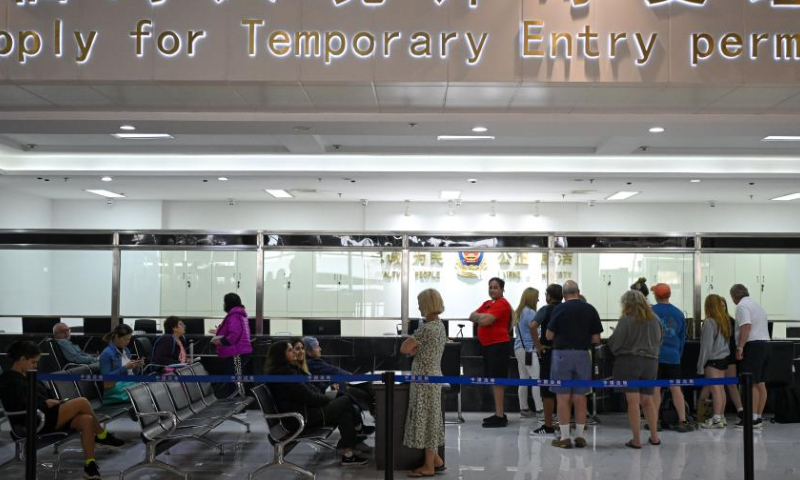
Foreign tourists apply for temporary entry permits at the Tianjin Dongjiang border inspection station in north China's Tianjin Municipality on April 7, 2024. Cruise ship Serenade of the Seas docked at Tianjin International Cruise Home Port in north China's port city of Tianjin on Sunday morning, with over 1,800 tourists from 50 countries and regions aboard. The ship will dock at Tianjin for two days and one night, carrying over 800 crew members and over 1,800 tourists. Most of the tourists will go sightseeing in the cities of Beijing and Tianjin. Tianjin International Cruise Home Port has welcomed 22 cruise ships and seen 68,000 tourist visits so far this year, according to Dong Zichen, deputy general manager of Tianjin International Cruise Home Port Co., Ltd. (Xinhua/Sun Fanyue)
China's National Immigration Administration (NIA) announced on Wednesday the full implementation of a visa exemption policy for foreign tourist groups entering China on cruise ships from the country's designated coastal provinces and cities. The policy will take immediate effect.
The nation aims to facilitate exchanges between Chinese and foreign personnel while promoting high-level opening-up to the outside world. With such visa policies in place, experts said that passenger arrivals may reach the pre-pandemic level of 2019.
Starting from Wednesday, foreign tourist groups (consisting of two or more people) traveling by cruise ship and organized by domestic travel agencies could enter the Chinese mainland without a visa as a whole group through designated cruise ports in 13 cities including Tianjin, Shanghai, Lianyungang in East China's Jiangsu Province, Wenzhou and Zhoushan in East China's Zhejiang Province, Xiamen in East China's Fujian Province, Guangzhou and Shenzhen in South China's Guangdong Province, Haikou and Sanya in South China's Hainan Province, Mao Xu, director-general of the Foreigners Management Department of the NIA, said at a press conference on Wednesday.
Tour groups ought to accompany the same cruise ship to the next port until the cruise ship leaves China, and their stay in China cannot exceed 15 days, with activities limited to the coastal provinces, municipalities and autonomous regions as well as Beijing, Mao said.
At the same time, in order to support the development of cruise tourism, seven cruise ports in cities including Dalian, Guangzhou and Shenzhen have been added as ports eligible for the visa-free transit policy for personnel from 54 countries, making it easier for foreign passengers to transfer and depart by cruise ship.
The implementation of this policy aims to promote the development of China's cruise economy and the cruise industry, as well as facilitate exchanges between Chinese and foreign nationals, Mao said.
These new policies provide a breakthrough that will surely inject new impetus into the whole inbound tourism industry, which will bear more fruit as the implementation continues, Yang Jinsong, a senior expert with the China Tourism Academy, told the Global Times on Wednesday.
Since the second half of 2023, more and more tourism-related policies have been put in place, including visa-free policies and easy payment methods for foreigners, as part of the effort to boost people-to-people exchanges, and Wednesday's announcement is an important follow-up of these efforts, Yang said.
"The newly announced policy expansion from the original 15-day cruise visa exemption at Shanghai port to other ports mainly signifies the global and port visit itinerary planning for international cruise companies, benefiting Chinese ports in attracting more international tourists," Helen Huang, President of MSC Cruises China, told the Global Times on Wednesday.
Another industry insider told the Global Times on Wednesday on condition of anonymity that the new policy, which expands the scope of China's visa-free travel measures, will facilitate the work of international cruise companies whose ships make stopovers in China.
The latest moves draw on the experience of earlier policy trials. Since October 2016, China has provided a pilot visa-free policy for inbound cruise tour groups in Shanghai. Since then, Shanghai has seen an average annual growth rate of 10 percent in cruise passenger trips, injecting new momentum into the high-quality development of Shanghai and coastal economies.
Based on the success of the pilot policy in Shanghai, the new implementation makes it more flexible in terms of entry ports and the range of stays.
For example, the previous pilot policy in Shanghai only allowed cruise ships to enter from the port of Shanghai. Although it permitted tourism in coastal provinces and cities, a single-entry port couldn't meet the actual needs of cruise services to China or the growing number of foreign tourists, according to Mao.
Moreover, the range of stays is broader under the new policy.
To ensure the smooth implementation of the visa-free policy for cruise ships, optimization measures have been put in place. This process includes exempting foreign passengers arriving by cruise ship from providing biometric information like their fingerprints, said Li Tao, deputy director of the Border Inspection and Management Department of the NIA, on Wednesday.
China's cruise sector has been showing robust growth. In 2023, there were 107,000 cruise passenger trips, and currently, 21 international cruise ships are operating in domestic ports, Zhu Zhenyu, deputy director of the Water Transport Bureau of the Ministry of Transport, said at Wednesday's press conference.




